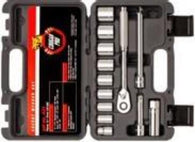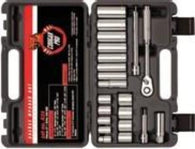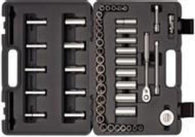Hand Tools
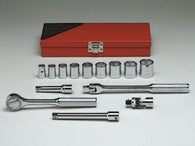
3/8" Dr., 14 Pc. 6 Pt. Std. Socket Set, 3/8" - 7/8"
Product Number: 335
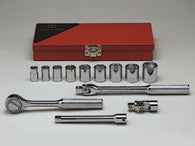
3/8" Dr., 13 Pc. 6 Pt. Std. Socket Set, 3/8" - 7/8"
Product Number: 329
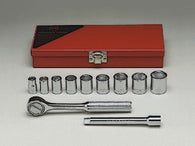
3/8" Dr., 11 Pc. 6 Pt. Std. Socket Set, 3/8" - 7/8"
Product Number: 327
Industrial Hand Tools:
So what makes industrial hand tools better than regular hand tools? As with anything in the market you get what you pay for, but it is also important to get the right tool for the job. For instance, if you are just tightening a screw or bolt on something around your house then an economy hand tool will do the job and last a long time. If you're a professional worker and the job is part of your daily activity, then you want to invest in a high-quality industrial tool.
Ergonomics:
Another big reason to invest in a set of quality industrial tools is safety. When we talk about safety in industrial tools it's not just about the quality or durability of the tool itself but about how comfortable the tool is to the user. Ergonomics is a big part of what separates low-grade tools from quality industrial hand tools that a professional requires to do their work efficiently and safely. Better quality hand tools have implemented the ergonomic design into their products. Craftsmen that use these tools on a daily basis can appreciate the design because they are more comfortable to use and in many cases gives them better control over the tool to do their job.
Choosing the Right Screw Driver:
A screwdriver is one of the most important tools in your box because it is used most often. Screwdrivers come in a flat blade, Phillips head, Torx, or square point design to accommodate different types of screws and fasteners. Screwdrivers are not all of the same quality and the differences can be very big, especially when you go to use them. Lower-grade screwdrivers are nothing more than steel rods stamped to create the blade tip and have a plastic injected handle. A good quality screwdriver is usually made from a forged steel rod and the tips are ground for tight tolerances. They come with a handle that is molded onto the shaft and gives a more comfortable grip. It is also important to have a full set of screwdrivers so that the blades match the size of the fastener. Too many people use too small or too large a blade to remove a screw and get frustrated or even injured when the blade slips.
Socket Wrenches: The socket wrench combines an offset handle with a male drive piece that has a spring-loaded bearing to lock on various size sockets. The big advantage is that they can be used at almost any angle. The most common type is the detachable socket wrench, with a square drive for hand use. Common square drive sizes are ¼”, 3/8”, and ½”, and these are normally used with a socket wrench. Sockets are available with 6, 8 and 12-point gripping ends, in a full range of inch and metric sizes.
Torque Wrenches: A torque wrench is designed to permit an operator to determine applied torque on bolts, nuts, and other fasteners. The torque value (generally measured in foot-pounds) is set to a micrometer scale on the handle or preset by an adjusting screw in the handle. Typically, they have square drives to use standard detachable ¼”, 3/8”, ½” and ¾” sockets. Available with an audible signal (clicking sound) or visual display, many torque wrenches are available with dual scales for conventional and metric measurements.
Choosing the Right Pliers:
Pliers come in many types and sizes. Better quality pliers are generally forged rather than die cast. Forging helps reduce the imperfections and strengthens the tool whereas die cast is more porous and weak. It is generally worth the extra cost to buy a good set of forged pliers.
Pliers are not Wrenches:
Pliers are designed for gripping or cutting objects using leverage. Different jaw configurations are designed to grip, turn, pull, and crimp or cut a variety of items. Wrenches are single handled tools utilizing a jaw adjustment mechanism, while open-end and box-joint wrenches feature a single, fixed jaw function to accommodate different fasteners
There are many types of pliers as listed below:
Tongue-and-Groove Pliers: Feature multiple jaw capacity adjustments by means of grooves or channels. They’re especially good for gripping and applying torque to round, square, flat and hexagonal fasteners which are commonly used on supply lines, drain lines, assorted nuts and bolts and various automotive applications.
End Cutting Nippers (Cutting Pliers): Have cutting blades on the end and are used to make clean flush cuts. Cutting pliers are great for nipping small nails, rivets and wire ends. Side cutters, or diagonal pliers, are the most common form of cutting pliers and are used on virtually all forms of electrical wiring.
Linemen’s Pliers (Cutting Pliers): Are designed for cutting, holding, shaping and twisting wire with some types having a built-in crimper for electrical terminals. These pliers are heavy-duty, side-cutting pliers designed for all regular wire-cutting needs. In addition to cutting edges, the pliers also have gripping jaws.
Long Nose Pliers or "Needlenose" Pliers: Have a long, pointed nose for working in tight places and are commonly used for electrical and electronics work.
Slip-Joint Pliers: A versatile form of pliers that provides two jaw positions. One adjustment forms a jaw-to-jaw mating of the two halves—perfect for grabbing extremely thin objects. The second adjustment leaves a gap between the jaws and allows for a larger overall jaw capacity. Slip-joint pliers can be used in a number of varied gripping and turning operations including specialized functions such as removing hose clamps and pulling steel strapping bands, along with a host of traditional nut-and-bolt turning operations.
Industrial Hand Tool Safety:
Don’t think that since hand tools are not powered, this makes you exempt from getting injured while using them. When using any hand tools make sure you have proper eye protection, gloves that provide grip and boots or closed toe shoes in case the hand tool or the object being worked on should fall and hit your foot.
Need Help? Industrial Tool Supply is happy to help you with selecting the right industrial hand tools for your specific needs.




